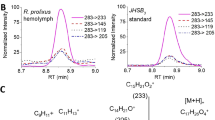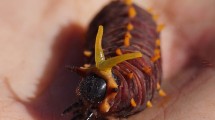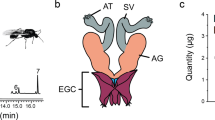Abstract
IT was suggested recently1 that the active substance (moulting hormone) which initiates cell division in the epidermis of Rhodnius and so induces moulting, and the substance (inhibitory hormone) which restrains metamorphosis until this insect is full-grown, are both secreted by the corpus allatum. By transplanting the corpus allatum from a younger insect (4th instar) into an older one (5th instar), which then develops into a nymph instead of an adult, it has since been proved that the absence of metamorphosis in the young stages is certainly dependent on the secretion of this gland; though it is still uncertain whether there are really two hormones or only a single one in different concentrations. Further, both moulting and inhibitory effects are non-specific: both can be produced in Rhodnius by appropriate secretions from bugs of the allied genus Triatoma.
This is a preview of subscription content, access via your institution
Access options
Subscribe to this journal
Receive 51 print issues and online access
$199.00 per year
only $3.90 per issue
Buy this article
- Purchase on Springer Link
- Instant access to full article PDF
Prices may be subject to local taxes which are calculated during checkout
Similar content being viewed by others
References
V. B. Wigglesworth, Quart. J. Micr. Sci., 77, 191; 1934.
Author information
Authors and Affiliations
Rights and permissions
About this article
Cite this article
WIGGLESWORTH, V. Functions of the Corpus Allatum of Insects. Nature 136, 338–339 (1935). https://doi.org/10.1038/136338c0
Issue Date:
DOI: https://doi.org/10.1038/136338c0
This article is cited by
-
Inhibition by Juvenile Hormone of Growth of Crithidia fasciculata in Culture
Nature (1969)
-
Malaria in War
Nature (1941)
Comments
By submitting a comment you agree to abide by our Terms and Community Guidelines. If you find something abusive or that does not comply with our terms or guidelines please flag it as inappropriate.



